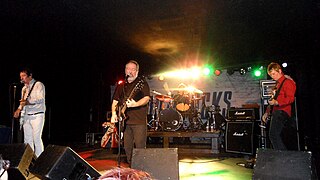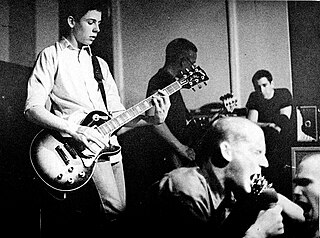Punk rock is a music genre that emerged in the mid-1970s. Rooted in 1950s rock and roll and 1960s garage rock, punk bands rejected the perceived excesses of mainstream 1970s rock music. They typically produced short, fast-paced songs with hard-edged melodies and singing styles, stripped-down instrumentation, and often shouted political, anti-establishment lyrics. Punk embraces a DIY ethic; many bands self-produce recordings and distribute them through independent record labels.

The Clash were an English rock band formed in London in 1976 who were key players in the original wave of British punk rock. Billed as "The Only Band That Matters", they also contributed to the post-punk and new wave movements that emerged in the wake of punk and employed elements of a variety of genres including reggae, dub, funk, ska, and rockabilly. For most of their recording career, the Clash consisted of lead vocalist and rhythm guitarist Joe Strummer, lead guitarist and vocalist Mick Jones, bassist Paul Simonon, and drummer Nicky "Topper" Headon.

Buzzcocks are an English punk rock band that singer-songwriter-guitarist Pete Shelley and singer-songwriter Howard Devoto formed in Bolton in 1976. During their career, the band combined elements of punk rock, power pop, and pop punk. They achieved commercial success with singles that fuse pop craftsmanship with rapid-fire punk energy; these singles were later collected on Singles Going Steady, an acclaimed compilation album music journalist and critic Ned Raggett described as a "punk masterpiece".

Green Day is an American rock band formed in the East Bay of California in 1987 by lead vocalist and guitarist Billie Joe Armstrong, together with bassist and backing vocalist Mike Dirnt. For most of the band's career they have been a power trio with drummer Tré Cool, who replaced John Kiffmeyer in 1990 before the recording of the band's second studio album, Kerplunk (1991). Before taking its current name in 1989, Green Day was called Blood Rage, then Sweet Children. They were part of the late 1980s/early 1990s Bay Area punk scene that emerged from the 924 Gilman Street club in Berkeley, California. The band's early releases were with the independent record label Lookout! Records. In 1994, their major-label debut Dookie, released through Reprise Records, became a breakout success and eventually shipped over 10 million copies in the U.S. Alongside fellow California punk bands Bad Religion, the Offspring, Rancid, NOFX, Pennywise and Social Distortion, Green Day is credited with popularizing mainstream interest in punk rock in the U.S.

Hardcore punk is a punk rock music genre and subculture that originated in the late 1970s. It is generally faster, harder, and more aggressive than other forms of punk rock. Its roots can be traced to earlier punk scenes in San Francisco and Southern California which arose as a reaction against the still predominant hippie cultural climate of the time. It was also inspired by Washington D.C. and New York punk rock and early proto-punk. Hardcore punk generally disavows commercialism, the established music industry and "anything similar to the characteristics of mainstream rock" and often addresses social and political topics with "confrontational, politically-charged lyrics".
Emo is a rock music genre characterized by emotional, often confessional lyrics. It emerged as a style of hardcore punk and post-hardcore from the mid-1980s Washington, D.C. hardcore scene, where it was known as emotional hardcore or emocore. The bands Rites of Spring and Embrace, among others, pioneered the genre. In the early and mid 1990s, emo was adopted and reinvented by alternative rock, indie rock, punk rock, and pop-punk bands, including Sunny Day Real Estate, Jawbreaker, Cap'n Jazz, and Jimmy Eat World. By the mid-1990s, Braid, the Promise Ring, and the Get Up Kids emerged from Midwest emo, and several independent record labels began to specialize in the genre. Meanwhile, screamo, a more aggressive style of emo using screamed vocals, also emerged, pioneered by the San Diego bands Heroin and Antioch Arrow. Screamo achieved mainstream success in the 2000s with bands like Hawthorne Heights, Silverstein, Story of the Year, Thursday, the Used, and Underoath.

AFI is an American rock band from Ukiah, California, formed in 1991. Since 1998, it consists of lead vocalist Davey Havok, drummer and backing vocalist Adam Carson, bassist, backing vocalist and keyboardist Hunter Burgan, and guitarist, backing vocalist and keyboardist Jade Puget. Havok and Carson are the sole remaining original members. Originally a hardcore punk band, they have since delved into many genres, starting with horror punk and following through post-hardcore and emo into alternative rock and gothic rock.
Pop-punk is a rock music fusion genre that combines elements of punk rock with power pop or pop. It is defined by its fast-paced, energetic tempos, and emphasis on classic pop songcraft, as well as adolescent and anti-suburbia themes. It is distinguished from other punk-variant genres by drawing more heavily from 1960s bands such as the Beatles, the Kinks, and the Beach Boys. The genre has evolved throughout its history, absorbing elements from new wave, college rock, ska, rap, emo, boy band pop and even hardcore punk. It is sometimes considered interchangeable with power pop and skate punk.
Ska punk is a fusion genre that mixes ska music and punk rock music together. Ska punk tends to feature brass instruments, especially horns such as trumpets, trombones and woodwind instruments like saxophones, making the genre distinct from other forms of punk rock. It is closely tied to third wave ska which reached its zenith in the mid-1990s.
Skate punk is a skater subculture and punk rock subgenre that developed in the 1980s. Originally a form of hardcore punk that had been closely associated with skate culture, skate punk evolved into a more melodic genre of punk rock in the 1990s similar to pop punk. Since then, it has predominately featured fast tempos, lead guitar playing, fast drumming, and singing. Occasionally, skate punk also combines the fast tempos of hardcore punk and melodic hardcore with the catchy hooks of pop-punk.

Pete Shelley was an English singer, songwriter and guitarist. He formed early punk band Buzzcocks with Howard Devoto in 1976, and became the lead singer and guitarist in 1977 when Devoto left. The group released their biggest hit "Ever Fallen in Love " in 1978. The band broke up in 1981 and reformed at the end of the decade. Shelley also had a solo career; his song "Homosapien" charted in North America in 1981 and 1982.

Tested is a live album by punk rock band Bad Religion. It was recorded in the USA, Canada, Germany, Estonia, Denmark, Italy and Austria, in 1996, and released in 1997. It is Bad Religion's second live album. Instead of using crowd microphones and mobile studios like most live albums, the band tapped the inputs, for a result that portrays Bad Religion's live sound without crowd noise. It also includes three new songs; "Dream of Unity," "It's Reciprocal," and the title track.
The Estonian rock music scene saw its beginnings in the mid-1960s during Nikita Khrushchev's thaw in the Soviet Union and the rise of British bands all over the world. The first Estonian rock-groups were primarily high school bands playing cover versions of the current UK Top 10. Despite the lack of official support from Soviet authorities some of these groups, posing as dance music bands in various clubs, gained a large underground following. Some groups managed to make proper studio recordings and appear a couple of times on television.
The Flowers of Romance may refer to:

J.M.K.E. is an Estonian punk rock band, which formed in Tallinn on January 18, 1986.
Propeller is an Estonian punk band formed in 1978.
Bedwetters are an Estonian pop punk band formed in September 2004. They became known in the spring of 2007 when they won a major contest for Estonian new groups. The band didn't play together between May 2013 and June 2022.

Agent M is an Estonian alternative rock group with new wave and post-punk influences. Their songs are sung in Estonian and English.
On-off or Onoff may refer to:
Estonian punk is a punk movement in Estonia, part of the international punk subculture.









